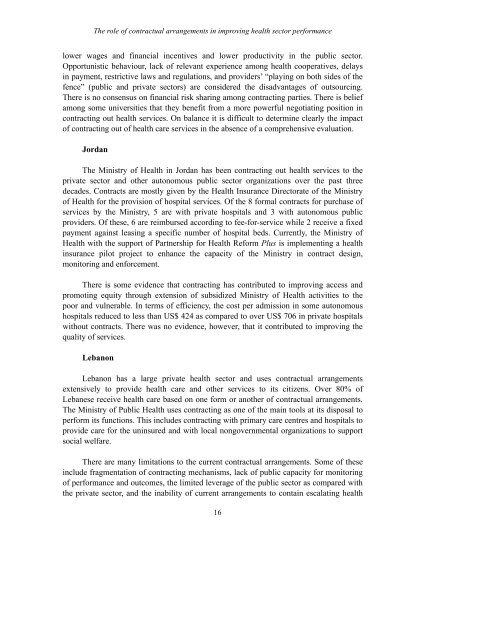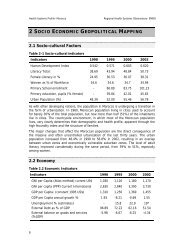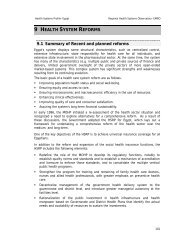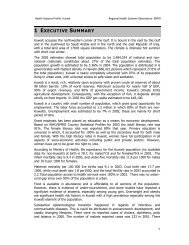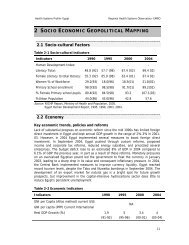The role of contractual arrangements in improving health sector ...
The role of contractual arrangements in improving health sector ...
The role of contractual arrangements in improving health sector ...
Create successful ePaper yourself
Turn your PDF publications into a flip-book with our unique Google optimized e-Paper software.
<strong>The</strong> <strong>role</strong> <strong>of</strong> <strong>contractual</strong> <strong>arrangements</strong> <strong>in</strong> improv<strong>in</strong>g <strong>health</strong> <strong>sector</strong> performance<br />
lower wages and f<strong>in</strong>ancial <strong>in</strong>centives and lower productivity <strong>in</strong> the public <strong>sector</strong>.<br />
Opportunistic behaviour, lack <strong>of</strong> relevant experience among <strong>health</strong> cooperatives, delays<br />
<strong>in</strong> payment, restrictive laws and regulations, and providers’ “play<strong>in</strong>g on both sides <strong>of</strong> the<br />
fence” (public and private <strong>sector</strong>s) are considered the disadvantages <strong>of</strong> outsourc<strong>in</strong>g.<br />
<strong>The</strong>re is no consensus on f<strong>in</strong>ancial risk shar<strong>in</strong>g among contract<strong>in</strong>g parties. <strong>The</strong>re is belief<br />
among some universities that they benefit from a more powerful negotiat<strong>in</strong>g position <strong>in</strong><br />
contract<strong>in</strong>g out <strong>health</strong> services. On balance it is difficult to determ<strong>in</strong>e clearly the impact<br />
<strong>of</strong> contract<strong>in</strong>g out <strong>of</strong> <strong>health</strong> care services <strong>in</strong> the absence <strong>of</strong> a comprehensive evaluation.<br />
Jordan<br />
<strong>The</strong> M<strong>in</strong>istry <strong>of</strong> Health <strong>in</strong> Jordan has been contract<strong>in</strong>g out <strong>health</strong> services to the<br />
private <strong>sector</strong> and other autonomous public <strong>sector</strong> organizations over the past three<br />
decades. Contracts are mostly given by the Health Insurance Directorate <strong>of</strong> the M<strong>in</strong>istry<br />
<strong>of</strong> Health for the provision <strong>of</strong> hospital services. Of the 8 formal contracts for purchase <strong>of</strong><br />
services by the M<strong>in</strong>istry, 5 are with private hospitals and 3 with autonomous public<br />
providers. Of these, 6 are reimbursed accord<strong>in</strong>g to fee-for-service while 2 receive a fixed<br />
payment aga<strong>in</strong>st leas<strong>in</strong>g a specific number <strong>of</strong> hospital beds. Currently, the M<strong>in</strong>istry <strong>of</strong><br />
Health with the support <strong>of</strong> Partnership for Health Reform Plus is implement<strong>in</strong>g a <strong>health</strong><br />
<strong>in</strong>surance pilot project to enhance the capacity <strong>of</strong> the M<strong>in</strong>istry <strong>in</strong> contract design,<br />
monitor<strong>in</strong>g and enforcement.<br />
<strong>The</strong>re is some evidence that contract<strong>in</strong>g has contributed to improv<strong>in</strong>g access and<br />
promot<strong>in</strong>g equity through extension <strong>of</strong> subsidized M<strong>in</strong>istry <strong>of</strong> Health activities to the<br />
poor and vulnerable. In terms <strong>of</strong> efficiency, the cost per admission <strong>in</strong> some autonomous<br />
hospitals reduced to less than US$ 424 as compared to over US$ 706 <strong>in</strong> private hospitals<br />
without contracts. <strong>The</strong>re was no evidence, however, that it contributed to improv<strong>in</strong>g the<br />
quality <strong>of</strong> services.<br />
Lebanon<br />
Lebanon has a large private <strong>health</strong> <strong>sector</strong> and uses <strong>contractual</strong> <strong>arrangements</strong><br />
extensively to provide <strong>health</strong> care and other services to its citizens. Over 80% <strong>of</strong><br />
Lebanese receive <strong>health</strong> care based on one form or another <strong>of</strong> <strong>contractual</strong> <strong>arrangements</strong>.<br />
<strong>The</strong> M<strong>in</strong>istry <strong>of</strong> Public Health uses contract<strong>in</strong>g as one <strong>of</strong> the ma<strong>in</strong> tools at its disposal to<br />
perform its functions. This <strong>in</strong>cludes contract<strong>in</strong>g with primary care centres and hospitals to<br />
provide care for the un<strong>in</strong>sured and with local nongovernmental organizations to support<br />
social welfare.<br />
<strong>The</strong>re are many limitations to the current <strong>contractual</strong> <strong>arrangements</strong>. Some <strong>of</strong> these<br />
<strong>in</strong>clude fragmentation <strong>of</strong> contract<strong>in</strong>g mechanisms, lack <strong>of</strong> public capacity for monitor<strong>in</strong>g<br />
<strong>of</strong> performance and outcomes, the limited leverage <strong>of</strong> the public <strong>sector</strong> as compared with<br />
the private <strong>sector</strong>, and the <strong>in</strong>ability <strong>of</strong> current <strong>arrangements</strong> to conta<strong>in</strong> escalat<strong>in</strong>g <strong>health</strong><br />
16


